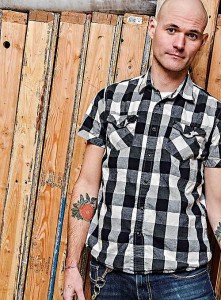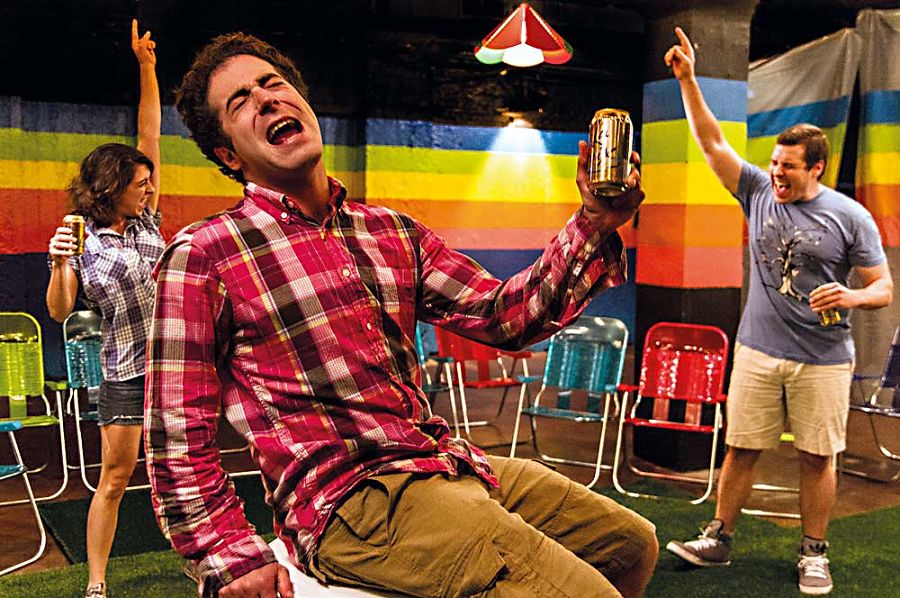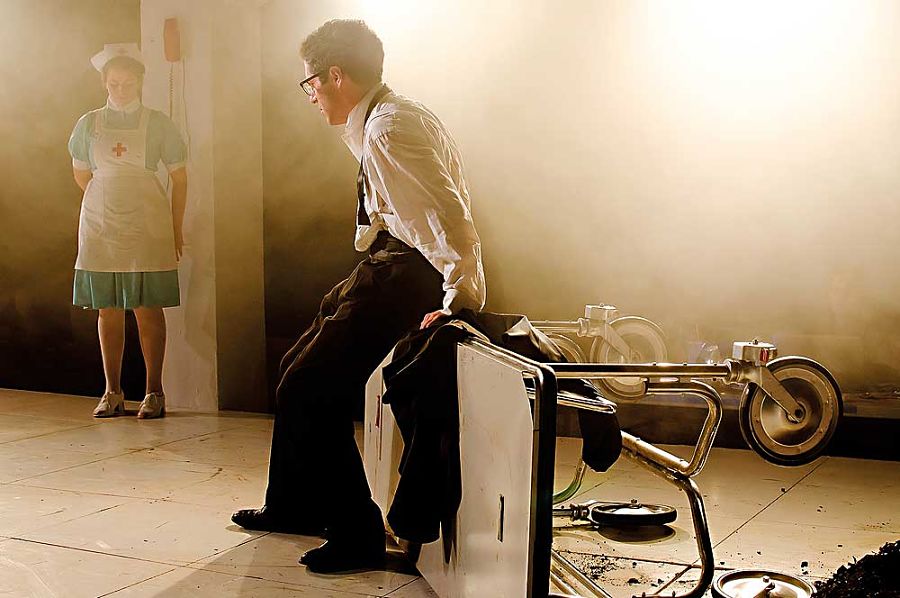On a bright Chicago afternoon this past August, Sean Graney, the founding and now-departing artistic director of the Hypocrites, is just three days away from opening the company’s 17th season with a loose, jolly new version of Twelfth Night he’s adapted and directed. The day after opening, Graney and his wife will move to Cambridge, Mass., where he’s received a yearlong fellowship at Harvard’s Radcliffe Institute to work on his latest project, a 12-hour adaptation of all 32 surviving Greek tragedies. He’s titled the piece All Our Tragic.
Yet as he sits down at a café in Chicago’s Wicker Park neighborhood, down the street from the Chopin Theatre where most of the Hypocrites’ productions of the last few seasons have been staged, Graney seems rather loose and jolly himself.
Like his productions, Graney has always had a bit of a puckish quality. These days he may be less likely than he was a decade ago to show up to the Jeff Awards ceremony with a pair of sparkly angel’s wings strapped to his back, but he’s still boyish-looking at 40, his bald head often covered by a jauntily cocked baseball cap. On the cusp of a new chapter, Graney’s mien matches the tenor of his recent work: He’s having a good time.
In the years since Graney founded the Hypocrites in 1997, it’s gone from a bratty startup producing punky takes on classic plays to an Off-Loop institution—that still largely produces punky takes on classic plays.

He had been an acting major at Emerson College, near where he grew up outside Boston. “I was lucky enough to have a teacher tell me I was a bad actor,” Graney says now. “It was shocking, but something about it sat right with me. I looked for other ways to get involved with theatre.”
Upon graduating, Graney moved to Chicago in 1995 after a single visit to check out the scene. “I wanted to move to a theatre-friendly city, and I was gonna visit Seattle and Chicago,” he says. “I visited Chicago and saw Too Much Light Makes the Baby Go Blind, and I was like, ‘This is the city I want to be in.’ I didn’t even visit Seattle.”
The 22-year-old had decided he was going to be a playwright. “I would sit in my room and drink a lot of cheap beer and write bad poetry,” he says with a self-mocking note in his voice. “After two years of not writing any plays, and not even knowing what it meant to be a playwright, I decided to give up.”
Daunted artistically but still wanting to stay connected to theatre, Graney got a job as house manager at what was then the Shakespeare Repertory (now Chicago Shakespeare Theater). On the job, he befriended actors like Larry Yando and Joe Foust, who gave him pointers on what productions to see and who he should introduce himself to.
“I got a really great sort of inside tutorial on Chicago theatre, and a lot of free tickets,” Graney recalls. He began to see that persistence often trumped quality. “The thing about Chicago theatre is that in order to be successful, you don’t have to make good theatre—you just have to keep making. I would see a lot of successful companies and be like, ‘Wow, that theatre is terrible. Nobody in the audience is having a good time.’ So I decided to start a theatre company. And with little to no directing experience, I decided to direct everything.”
The Hypocrites’ focus on classics, Graney says today, was born out of his dissatisfaction with his own writing skills: “Coming out of my loathing of playwriting—of myself as a playwright—I decided we weren’t going to do any original plays.”
A letter-writing campaign in those pre-Kickstarter days raised $250 for the company’s first production, Ionesco’s The Bald Soprano, staged in the basement of Café Voltaire, a now-defunct venue that incubated all kinds of (literally) underground performance through the 1990s. “It was the weirdest place—this really grungy vegetarian restaurant that had basically a cellar painted black,” Graney recalls. “People would, like, come by and get onions from the cooler during your show.”
Mechelle Moe, a cast member in The Bald Soprano, became one of the Hypocrites’ earliest ensemble members. Actor/director Steven Wilson came to see a college friend in the show, then returned with friends in tow, including Halena Kays, with whom he was waiting tables at the time. Soon they were part of the company, as well.
“I was watching a play where I felt very included—and not in an audience-participation way where I was being asked to do something,” Wilson recalls of that first production. “I also responded to the big forces sort of crashing into one another—I was amazed at how funny the show was and how incredibly sad it was at the same time.”
Soprano also caught the attention of Chicago critics. “Screeching and spilling all over the cellar, the Hypocrites attack this text with such energy that one feels exhausted just watching them,” wrote Chris Jones in the Chicago Tribune. “Rather than trot out another pointless revival of a play with more historical significance than contemporary relevance, the inventive and likable Hypocrites at least make it their own.”

“Making plays their own” is an apt, possibly understated description of what Graney’s Hypocrites have done. (The troupe’s moniker was reportedly inspired by Ionesco’s love/hate relationship with the theatre.) In the company’s first few seasons, Graney put his stamp on everything from Beckett’s Endgame to Sam Shepard’s Curse of the Starving Class. Many recall his 2000 production of The Cherry Orchard, staged at the cavernous converted-warehouse Viaduct Theater, as a milestone. Chicago Reader critic Justin Hayford wrote that Graney “turns Chekhov’s famous inaction positively madcap.”
Eight years later, I wrote in my Time Out Chicago review of Graney’s promenade production of Edward II at Chicago Shakespeare Theater, with Jeffrey Carlson as the embattled king, that while Marlowe was “the only playwright listed in the program…even casual observers of Chicago theatre know that when the director is Graney, an ‘adapted by’ credit is implied.”
Hypocrites ensemble member Geoff Button’s first encounter with the company was as an actor in a 2001 staging of Sophocles’ Ajax. “I showed up to the first day of rehearsal, and Sean started talking, and it was just so clear, even then, how smart he was. He was suggesting all sorts of ludicrous things to do with the play, that frankly onstage ended up being kind of ludicrous,” Button remembers. “But there was such a force of intellect behind every one of those decisions.
“And they were so counter to what I was trained in, a Midwestern, Meisner-based program,” Button adds. “I moved to Chicago thinking I was going to do Steppenwolf realism, and then I encounter Sean, who’s operating from an entirely different values system, but with as much or more intellect and purpose behind it. I was deeply seduced by it.”
Graney was soon upping the Expressionist ante of Sophie Treadwell’s 1928 Machinal with screeching electronic sound effects and projected video backdrops of frantic lab mice. He inserted sensationally salacious dance numbers into Büchner’s Leonce und Lena, with actors in matte white makeup and garish stockings. Eventually he’d stock a promenade staging of Strindberg’s Miss Julie with menacing roving stagehands in industrial jumpsuits and piles of desecrated doll parts. In Graney’s Oedipus, Wilson’s Creon obsessed over plastic hula girls while castmate Stacy Stoltz wailed angrily into a stand-up microphone.
Button went on to assist Graney on several subsequent productions. “It became clear that my role as assistant director was to help the actors understand intellectually why Sean was doing what he was doing,” Button says, chuckling. “He wasn’t always great at explaining it, but it was clear there was a huge amount of intent.”
What was perhaps less clear was Graney’s long-term intent for the Hypocrites as the company rocketed through its first several seasons. “Because I’m insane, I made like a five-year plan,” Graney allows. “Within two years, we had surpassed my five-year plan in terms of money coming in the door and the amount of work we were doing.” Why such runaway growth? “I have an insatiable ambition at times,” Graney admits. “It was hard for me to be, like, ‘We can only do this much.’ I would be, like, ‘There’s so much more we could be doing!’”
The ambition paid off as Graney’s public profile rose. In 2004 he was named best avant-garde director by Chicago magazine and “Chicagoan of the Year” in theatre by the Tribune. With those kinds of accolades, he began teaching at area schools, including the University of Chicago and Columbia College Chicago, and eventually directing at larger theatres. Edward II at Chicago Shakes followed a string of productions, including multiple credits for Chicago Children’s Theatre, The Elephant Man at Steppenwolf for Young Adults, and The Hairy Ape as part of Goodman Theatre’s Eugene O’Neill festival.
“In all of the work I’ve seen Sean do, he has this unique, idiosyncratic combination, which I so treasure and value,” says Charles Newell, artistic director of Court Theatre, where Graney has staged Joe Orton’s What the Butler Saw, Charles Ludlam’s The Mystery of Irma Vep and his own adaptation of The Comedy of Errors. “This is a guy who does more text, dramaturgical, literary and historical thinking and research than almost anyone I know. And he combines that with an expression, a realization of that text that is completely unique and of its own. You know when you’re seeing a Sean Graney show.”
Graney’s growing profile, though, fueled friction within the company. “I felt like for the first seven or eight years I was in an abusive relationship with the company, where I was giving and giving and giving, and getting nothing back aside from, like, good reviews,” Graney says. He makes clear that by “the company” he means “the abstract entity, not the people,” though he also acknowledges that “I valued the work over people early on, which I try not to do anymore.”
For a time, though, his personal success only made the tension worse, he admits. “Once I started directing outside the company, my attention to the company was so minimal, and antagonistic at times,” Graney says, looking down at his coffee with a slight shake of his head. “It flipped the tables on my relationship with the company—I started being like, ‘These are the shows we’re going to do, I don’t care what the audience thinks.’ It’s like I decided I was gonna just watch out for my own career, not for the health of the company.”

It’s true that the Hypocrites’ seasons began to seem more erratic. Leonce und Lena, Sarah Kane’s jarring 4.48 Psychosis and the garbage-strewn Miss Julie ran alongside revivals of dramas like Death of a Salesman and Cat on a Hot Tin Roof—all directed by Graney. You might know when you were seeing a Sean Graney show, but what it meant to see a Hypocrites show was less clear.
With gentle derision, Graney refers to this as his “high art” period, which he reckons peaked with a 2007 staging of Maria Irene Fornes’s Mud that placed the audience outside a huge aquarium inside which Kays, Button and Rob McLean wallowed in mud and garbage. “That thing nearly tanked our company, literally,” Wilson puns. “We spent all this money, and it was amazing—the 10 people who saw it were really into it.”
Graney began to think he was a detriment to the company as its artistic director. “I’m a decent director, but I’m not a good artistic director,” he reasons. “Artistic directors need to be invested in the business in a really smart, pragmatic way, which I was not.” In their 17th season, the Hypocrites are still itinerant and non-Equity, and their annual budget remains under $500,000. “They needed an artistic director focused on business to take it further, which I wasn’t willing or able to do.”
During 2010–11, when Halena Kays was in the final year of the M.F.A. directing program at the University of Texas–Austin, Graney began talking to her about taking over. “I decided I was either going to shut the doors of the company or give it to Halena. She was the only person who could do it.”
For her part, Kays says, “Trying to read Graney’s mind is a hobby I learned not to spend too much time on. But one of the greatest things about him is he knows himself well. And when he doesn’t like things, he doesn’t do them very well. He had tried over the years to find ways to make being the A.D. something he could do and enjoy, and I think it was getting harder and harder.”
It helped, certainly, that Kays had experienced a similar handoff from the founder’s perspective, having been the first artistic director of the Chicago educational troupe Barrel of Monkeys before handing it off to new caretakers. “I’m no stranger to what it’s like to run a little nonprofit, and that it’s not so glamorous,” she says. “I really love leading people and creating tight ensembles. I don’t hate having company meetings and talking about the nitty-gritty of what the company’s doing.”
So the change was made this year. Graney now describes his relationship with the Hypocrites—where he remains a primary artist but no longer the leader—as “great.”
In the company’s fourth season, 2001’s Ajax was the first Hypocrites production to credit Graney as adapter. (The next came the following season: Leviticus 18, “by God, adapted by Sean Graney.”)
“I came back to playwriting through directing,” Graney says. “I’m not a good original playwright. Where my writing thrives is in adaptation, where a lot of the work gets done in a room with actors.”
Graney’s philosophy of adaptation reveres the spirit of the playwright’s intent without worrying too much about the letter. “There are directors that go by the letter of the script, like what the playwright wrote is the letter of God, and it’s our responsibility as artists to bow down to that God. To me, that just sounds like, ‘What?! Why would you do that, why would you subject yourself to that kind of torture?’ ” he asks in a mock-strangled voice. “It doesn’t sound to me like the creation of art; it sounds like a math problem.
“What I can do is try to understand: ‘You wrote this play for your audience to do this to them. I am going to try to do that to my audiences that are 400 years older than your audiences, that have iPhones, that have lived through mixing.’”
His recent work has also replaced the literal walling-off of Mud with an embrace of an über-accessible, communal spirit—re-embracing, perhaps, that sense of including the audience in the watching that Wilson felt at The Bald Soprano in 1997. A big turning point in this populist transition was a goofy, immersive adaptation of The Pirates of Penzance, which debuted in 2010 and has since traveled to Cambridge’s American Repertory Theater and Actors Theatre of Louisville. In it, actors don old-timey swimwear and play their own instruments (with whimsical musical arrangements by Kevin O’Donnell).
Some form of breaking bread is often in the mix these days, as well. In 2011, Graney’s Hypocrites premiere, the terrifically realized Sophocles: Seven Sicknesses—a nearly four-hour mash-up of the Greek scribe’s septet of extant tragedies—included a dinner break with free nosh from a nearby vegetarian joint, as did a subsequent production at New York City’s Flea Theater. And a tea ceremony served by the cast preceded 2012’s Romeo Juliet, a four-actor adaptation of Shakespeare and other sources.
“We were all like, ‘That sounds horrible!’” says Hypocrites ensemble member and Romeo Juliet actor Tien Doman. “We thought, ‘This is going to be awful, we’re gonna not like talking to the audience, they’re not gonna want to talk to us, this is not how we like to interact with people—when I go to plays I don’t want people to talk to me.’ And yet as soon as it started, it was just right.”
“I think the vibe is very much a reflection of where Sean is,” says Doman’s castmate Zeke Sulkes. “He’s embarked on a new adventure and has ended a chapter, and with that, I think he felt a sense of release and a sense of joy.”
There’ll surely be a meal break or two in All Our Tragic, a project Graney began working on in early 2012 following the success of Seven Sicknesses.
“A lot of people are surprised at how much humor there is in these plays,” he says of his approach to “the Big Greek Thing.” “But what they forget is these plays were performed in groups of threes, and then they would have a satyr play, where people would use the themes from the three plays but be able to laugh at them. What I do is just take that spirit and work the comedy into the same play.”
During the 18 months he worked on writing All Our Tragic in Chicago, he held occasional readings with actors, including several Hypocrites members. In Cambridge, as part of the Radcliffe fellowship, there are regularly scheduled workshop sessions with actors from the ART Institute M.F.A. program, with Graney’s residency culminating in a public staged workshop on May 17.
“Directing and adapting is one job now in my head,” he says. “We’ll have a script when we’re done, but making that first production is part of the creative process for me. I don’t know how any playwright can come into a rehearsal with a finished script.”
But then, as Graney’s and the Hypocrites’ body of rediscovered and reinvigorated work suggests, no script is ever truly finished.
Kris Vire is the theatre critic for Time Out Chicago.


